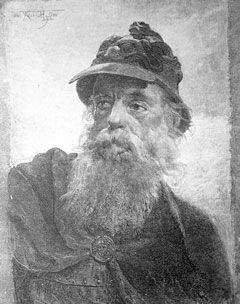

Baron De St Castin 1881
by Will H Lowe Wilson Museum Archives
The Baron of Saint-Castin and the Robichauds of Port-Royal
by Fernand Robichaud, Sorel-Tracy, Québec
It is known that by their marriages with the sisters Françoise and Marie LeBorgne of Belle-Isle, the daughters of Alexandre LeBorgne and Anastasie de Saint-Castin, the brothers Pierre and François Robichaud joined the lineage of Baron Jean-Vincent d'Abbadie de Saint-Castin, the latter being the father of their mother-in-law Anastasie de Saint-Castin.
The Baron de Saint-Castin had already left this world (1707) and Acadia (1701) at the time of the birth of the brothers Pierre (1713) and François (1716) Robichaud. But could the Robichauds of the preceding generation, more precisely Étienne's family, have had relations with the famous Baron?
If one refers to the literature and specifically to the books of Armand G. Robichaud, "Histoires de Robichaud" and "Les Flibustiers de l'Acadie" and the book of Marjolaine Saint-Pierre "Saint-Castin, baron français, chef amérindien", one might think that the Baron was not unknown to the Robichaud (Étienne and his sons) of Port-Royal. The family of Étienne was well established at Port-Royal at the height of the adventures of the Baron in Acadia. Like the Baron, the Robichauds were interested in the mercantile affairs of Port-Royal, except that the Baron, in addition to his status as a soldier of the Crown, was engaged in a much broader trade between France, Massachusetts, Port-Royal and its Franco-Amerindian village of Pentagoet.
The Baron was therefore not without presenting himself from time to time in Port-Royal since it was the main French trading post. Marjolaine Saint-Pierre in her book quotes the words of the Abbé Petit, pastor of Port-Royal in 1685; "He often gives us considerable alms for our church, and when he comes to see me, which usually happens twice a year, he is delighted to be present at the service we do on Sundays." "
It must be emphasized that the patriach Étienne Robichaud had married Françoise Boudrot. Françoise's brother, Abraham, became a merchant on the MARY, a ship belonging to the Baron. This Abraham, Étienne Robichaud's brother-in-law, traded illicitly with New England, with the blessing of Governor Villebon, and was at the same time a "spy" for Saint-Castin, knowing very well what was being developed in Boston and Pemaquid. Thus he was the master of various expeditions on behalf of the Baron, the best known being that expedition of the spring of 1691.
In the same year, 1691, Prudent Robichaud son of Étienne, married Henriette Petitpas. It is interesting to note that Jacques Petitpas, brother of Henriette and brother-in-law of Prudent, is one of the two Acadians who foiled a conspiracy to assassinate the Baron in 1692. Jacques Petitpas was son-in-law of Jean-Serreau de Saint-Aubin, the other Acadian.
In addition, we must mention the privateer Pierre-Baptiste Maisonnat, who married Madeleine Bourg in 1693 and whose mother is Marguerite Boudrot, sister of Abraham quoted above. This Baptiste Maisonnat found himself captain on the boat of Pierre Lemoyne d'Iberville in 1696 when taking Fort Pemaquid (a post between Acadia and New England). He is accompanied by the privateers Simon-Pierre Denys de Bonaventure and Louis Denys de la Ronde. The Baron of Saint-Castin and his Abenakis will take care of the ground attack. It should be noted that Baptiste Maisonnat, through his commercial activities with New England, was another informant of Saint-Castin.
Later, in the year 1700, Alexander Robichaud another son of Étienne married Anne-Marie Melançon, sister of Cécile, wife of Abraham Boudrot quoted above.
* It must be said that an illegal barter system that ensured the survival of the young colony was established for more than fifty years in Acadia. Beginning in 1689, relations between Port Royal and Boston deteriorated due to the wars between England and France, but without ending the illegal barter in Acadia. Freebooters, English pirates, French corsairs, have long been active in Acadia, albeit to a lesser extent after the Treaty of Utrecht (1713), which yielded the greater part of Acadia to England.
